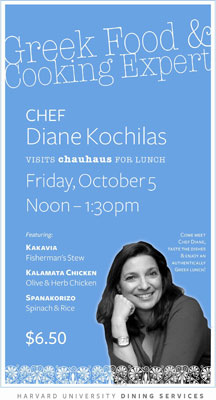Harvard Brings Greek Cuisine to Campus
01 December 2012
 The country’s oldest collegiate foodservice operation partners with a noted authority to meet student demand for cuisine authenticity.
The country’s oldest collegiate foodservice operation partners with a noted authority to meet student demand for cuisine authenticity.
Authentic Greek fare is being introduced to the menus and students at Harvard thanks to collaboration between chef and cookbook author Diane Kochilas and Harvard University Dining Services (HUDS). Beginning last summer and extending into the fall, Kochilas and HUDS have developed recipes, trainings and tastings, which will culminate in more than a dozen new items for HUDS’ residential-dining winter menus.
Greek cuisine, regarded for its nutritional benefits through the use of plant oils, lean proteins, vegetables and distinct seasonings, is an ideal fit for Harvard menus where students are increasingly interested in authenticity and health. Seafood and vegetarian options that appeal to non-vegetarians are among the most demanded items on student surveys.
Kochilas was a presenter at the Spring 2012 Worlds of Healthy Flavors conference, hosted by the Harvard School of Public Health and The Culinary Institute of America. HUDS’ managing director, David Davidson, and director for culinary operations Martin Breslin were in attendance and immediately saw the opportunity for bringing Kochilas’ expertise to campus.
“Our students come from all over the world,” says Davidson, “and many have also traveled extensively. When we make ethnic cuisines, students expect authentic flavors. They also want to challenge themselves with new foods, while making healthy choices. Diane’s culinary perspective was perfectly suited for us.”
As a result, HUDS asked Kochilas to develop multiple approaches for the Harvard menu, including a make-your-own station with Greek pita and complementing dips and toppings, as well as entrées, sides and salads. Harvard students will soon enjoy shrimp mikrolimano, spetsofai, kakavia (fish stew), marinated vegetable kebabs, tahini-yogurt dressing, classic tzatziki, olive mayonnaise and oven-fried Greek potatoes.
Kochilas came to campus Oct. 3-5 to help test recipes scaled for collegiate dining volume. She also conducted training with HUDS’ culinary team, acquainting them further with Greek culture, hallmark flavors and keys to recipe execution. In addition, Kochilas met with students through HUDS’ Food Literacy Project, both at a community table dinner to discuss Greek cuisine and culture and at a sold-out cooking demonstration and tasting.
After the tasting, one student noted, “Warm pita night was delicious! I am so excited to see this … In fact, more Greek influence in any aspect of the menu would be fantastic!”
“This has been a great experience,” says Kochilas. “I’m so proud to share the healthy, delicious foods of Greece, but likewise I’ve learned so much about how menu preparation for an operation of this scale works.”
In addition to new recipes for the board program, several of HUDS’ retail locations will also add a Greek Table concept, with fare sold by the ounce. Highlights include Santorini-style fava, htipiti (whipped spicy feta), classic tzatziki, pita bread, kalamata chicken, kakavia, oven-roasted eggplant and zucchini and classic spanakorizo.
“We’re incredibly excited about this partnership,” says Davidson. “Diane has selected some great recipes that really epitomize Greek cuisine and introduce new flavors and experiences for our students. And it’s always a lot of fun for our team to learn more from such a great, approachable culinary authority.”
Kochilas will return in next spring for further menu development and community engagement, to include cooking classes and programs with Harvard faculty and Greek student associations.
Harvard University Dining Services operates 13 residential dining halls, 14 campus retail cafés, a kosher kitchen, a campus debit-card program and complete catering services. The country’s oldest collegiate foodservice operation, HUDS serves approximately 5 million meals a year.
